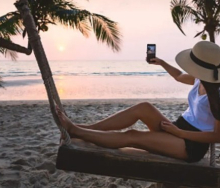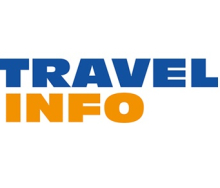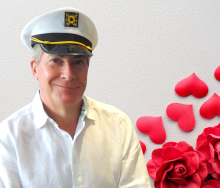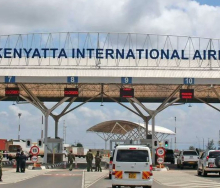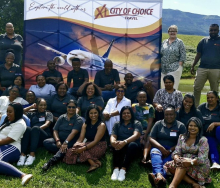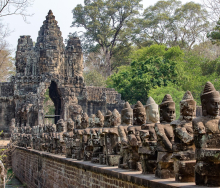Has the earnings gap closed?
EVERY year in October,
women in Europe,
including France, Germany
and the Czech Republic,
down tools and join the Equal
Pay Day protest. The day
marks the time of year when,
theoretically, women start
working free compared with
their male colleagues who
earn anywhere from 6% to
39% more.
In South Africa, that number
is around 25%, meaning
that female employees work
‘for nothing’ from October
to December compared with
the average male annual
remuneration package. Almost
half (47%) of the respondents
to a recent TNW Women
in Travel Survey felt that
this figure reflected the pay
discrepancy within the travel
industry too.
The survey had over
100 respondents, 92% of
whom were female.
“The travel industry is
run by women yet led by
men, therefore most of the
leadership roles are still
male dominated and that is
where, ultimately, the higher
pay resides,” says Carla da
Silva, Air Mauritius regional
gm: Africa & Latin America.
She says gender stereotypes
regarding men being the main
providers in a household as
introduced during childhood
are reinforced throughout
people’s lives. “However, the
statistics have indicated that
about 41% of women are
breadwinners.”
Yusra Dindar of Travel
Airscape says: “Gender
equality is a long struggle
that’s been years in the
making. Men are still seen as
the breadwinners, irrespective
of how independent women
have evolved… There should
be a policy change from the
top to the bottom, from the
individual to the leaders at
the world’s largest travel
operators.”
As a technology company,
Travelport, says country
manager – South Africa,
Claudette Thorne, is impacted
by existing wider gender pay
issues. “We believe that
the industry as a whole
faces a shared challenge to
inspire more girls to study
STEM (science, technology,
engineering and mathematics)
and pursue careers in our
sector,” she says.
But while the perception
is that men have the lion’s
share of leadership roles in
the industry and take home
more money, when it comes to
equal pay for equal work, the
travel industry appears to fare
better than other sectors.
Sam Van Gool, Flight
Centre Travel Group (FCTG)
Peopleworks gm, agrees that
the pay gap doesn’t exist
in the travel sector. “I know
that our people get paid
equally, based on roles not
on gender. There are other
factors that come into play,
like length of time in the role,
or maybe some tertiary or
external education or specific
experience, but it’s definitely
not a gender-based inequality,”
she says.
An anonymous survey
respondent points out:
“Travel is usually commissionbased,
and commission is
only earned if you work hard,
regardless of your gender.”
Michelle Bullmore, Travel
Counsellors marketing
and recruitment manager,
explains that a franchise
business model enables
unlimited earning potential
for all, meaning differences
in pay only exist in terms of
comparing one individual’s
business revenue to another.
“In fact, over half of our
top-performing Travel
Counsellors are female.”
According to Lee Raskinen,
executive: marketing and
communications South Africa
for Virgin Atlantic, the airline
doesn’t have an equal pay
issue. “Whether it’s our pilots,
engineers, cabin crew or our
office-based employees, we
have equal pay between men
and women for equal work,”
she says.
Rise of the girl boss
One reason many believe
men earn higher salaries
than women in the travel
industry is the number of
senior, managerial roles held
by men. Jessica Kantola
Green of Pentravel, says: “I
feel that men occupy some of
the higher levels of seniority,
which automatically entitles
them to earn more. However,
there are still not as many
men in travel as there are
women, especially in the lower
levels of employment, such as
travel consultants.”
Claudette says women
make up nearly 70% of
South Africa’s travel and
tourism workforce but cites
the Department of Tourism’s
findings that there is a huge
underrepresentation of women
in senior positions. She says
women hold less than 40%
of all managerial positions,
less than 20% of general
management roles and
between 5% and 8% of board
positions.
Asata ceo, Otto de Vries,
says the dominance of
men in senior roles is
no different to any other
business sector. “However,
it must be noted that even
though the majority of Asata
agencies are still headed by
men, a considerable number
of women are currently in
leadership roles and this
number is growing.”
When it comes to retaining
female professionals, Otto
says companies need to
offer leadership programmes
that give women tools to
build confidence, develop
a leadership presence and
build relationships. “Networks
of support are vital when it
comes to developing leaders.”
Carla believes the leadership
inequalities are due to men
aspiring to leadership roles
and making their career
aspirations known. “Ask a
man to explain his success
and he will typically credit
his own innate qualities and
skills. Men are more confident
and they are promoted on
potential as opposed to
women [who rely] on their
proven track records.” She
adds that men are more
likely to chase a growth
opportunity that has yet to
even open, while women tend
to be cautious about changing
roles and seeking new
opportunities.
“I do promote women
based on potential and
encourage them to take on
roles previously only held by
men,” says Carla. She says
she encourages balance
because men and women
working together can form a
formidable team. “I like to
expose women who put their
hands up, want to grow and
embrace new challenges to
different roles and projects
in different departments. I
also encourage information
sharing, transfer of knowledge
and skills and opportunities
for growth and development
purposes,” says Carla.
The majority of survey
respondents (82%) claimed
they had never been treated
unfairly because of their
gender or been denied
opportunities to grow.
Anneke Geldenhuys, gm of
Harvey World Travel Southern
Africa, says the majority of
the senior members of staff
at the company are women.
“We encourage all our staff
members to participate in
as much training and skills
development as they can, to
be in a position to qualify for
a promotion.” She explains
that Harvey World Travel has
around 350 staff members
in just over 73 branded
branches, of which 69% are
women owners/directors.
Some 85% of the company’s
staff members are women.
Tammy Hunt, md of eTravel,
says senior roles at the
company are mostly filled
by women, but adds: “More
importantly, regardless of the
gender of the individual, we
have the right personalities
with the required skill set in
the right positions.”
Similarly, Claudette says
Travelport believes in gender
equality. “We have a better
chance of advancing the
mission of our company if we
get both genders engaged
in contributing and driving
our objectives… For me,
the key to any success lies
in empowerment through
education and a relentless
hunger to outperform oneself.”
Travelport offers flexible
working hours for employees
(both male and female)
who find it challenging to
manage work, family and
other commitments within the
standard working day.
Further, the company
offers mentoring for its
employees, which often
involves senior women helping
more junior women develop
and progress.
Claudette refers to a 2016
study by Peterson Institute
for International Economics
and EY, which revealed
that women placed in the
highest corporate positions
correlated with increased
profitability. “Studies
like this have helped
ensure gender diversity
in leadership teams is
no longer seen as an
option, but a prerequisite
for innovation and
competitiveness.”
At Indaba in 2017,
then Minister of Tourism,
Tokozile Xasa, launched
the Women in Tourism
(WiT) 30in5 campaign.
“It aims to target 30%
female representation in
executive management
and board directorship
positions by 2022, in line
with the goals set out in the
Tourism B-BBEE scorecard.
Travelport supports such
initiatives and believes we
need more collaborative
efforts that champion
women’s empowerment,”
says Claudette.
According to Sam, FCTG’s
executive team is made up
of 50% women, while the
senior leadership is 70%
female. “Our stats show
that, across all our team
leaders in the country,
we’re sitting at 60% being
female.” She adds that
while this is
a focus for the company
from a global perspective,
South Africa leads the way
because of the country’s
focus on diversity and
equality. “This has stood
us in good stead because
we’ve been focusing on it
for so many years.”
Carol Eedes of Alphabet
Travel says the dominance
of men in leadership is part
of a legacy that needs to
be rectified in a dignified
and merit-based manor.
“People need to know that
females are very capable
of doing the job well… All
races and genders should
be given equal opportunity
to compete for a position,
however it is absolutely
critical that the chosen
person is there based on
merit or experience and
not because they require
upliftment. There is no point
in being rewarded with a
position if one can’t do
the job.”
Crossing the line
SOME 11% of survey
respondents report
having been made to feel
uncomfortable and/or
been harassed by a male
colleague whose behaviour
was inappropriate. While
the number represents
a minority, any incidents
of this nature are
unacceptable.
Monique Victor of
Victor Voyages, says while
working as the manager at
a previous company, the
male owner made it clear
that because she was
female she was “below
him”. “He told me to wait
outside his door to have
cheques signed while male
colleagues were shown in
before me. I stood for four
hours and then made a
really good decision that
that was enough, and I
resigned that day,” she
says.
Earlier in her career,
Monique found herself
doing the same job as an
intermediate consultant
yet earning less than
a more junior male
counterpart. “When I
approached HR about an
increase as I had hit my
targets, I was told this
want not a possibility, yet
my male colleague made
it well known that he had
received one. I also did
not see my career going
very far at that company
and found another position
elsewhere,” she says.
Moira McDermott
a Travel Counsellor in
Knysna, has experienced
inappropriate behaviour
in the course of her
career, including “a
pat on the rear, and
inappropriate language
and suggestions”.
After her divorce, a
director of the company
she worked for at the
time made inappropriate
advances and comments
about her sex life as she
no longer had a husband.
“I soon learned to tell
them to cut it out, but
when you are young and
need your job, it is a tough
situation,” says Moira.
Asata’s Otto de
Vries says: “We find it
disturbing if indeed female
employees are finding it
difficult to speak out about
such challenges, given the
various HR processes that
should be in place, aligned
to the Basic Conditions of
Employment and other SA
legislation.”
Travelport, says Claudette
Thorne, takes any form of
discrimination very seriously.
“We hold internal events
on gender equality across
the world, often around
International Women’s
Day. These are designed
to ensure our employees
understand our firm position
on the subject, the issues
affecting our industry, and
that reported incidents are
treated seriously.”
But it’s not always
co-workers who are guilty of
this behaviour. Some survey
respondents pointed out
that they had been victims of
inappropriate behaviour from
male clients too. FCTG has
had instances like this in two
separate scenarios – with
staff of colour and female
employees – explains Sam
Van Gool. “We have taken
the stance that we’d rather
not have the customer’s
business if they continue
to speak to our staff in that
way,” she adds.
A survey respondent says
a big challenge facing the
industry is that there is no
work union to approach when
being unfairly treated. “HR
tends to be on the same
side as management in most
cases and there is no one
else to reach out to when
you have not been treated
fairly or correctly,” she adds.
Lee Botti grooms school leavers for the workplace
RECOGNISING a
skills shortage
in the market
and a lack of
opportunities for
disadvantaged
school leavers to
easily enter the
industry, Lee Botti
founded the iThuba
programme.
The programme
assists grade
11s and 12s
to empower
themselves and learn more
about the opportunities in the
workplace.
“The learners are taught
how to approach the difficult
job market after school,”
says director of Lee Botti &
Associates, Jill
Morris. Jill says
in recruiting for
the travel industry
for more than 40
years, her company
has seen the
industry go through
many changes.
“The industry
tends to attract
hugely diverse
and interesting
people… The
travel industry has
traditionally employed a large
number of women, many
of whom have achieved
successful roles. We continue
to see some amazing women
achieving amazing things in
this industry,” she adds.
FCTG brings women together
OVER the next month, Flight
Centre is rolling out Women
Wise, which gives females
an opportunity to meet
with other high-powered
females.
“The idea is to start with
two people meeting, then
have each person invite
another person so you get
four high-powered females
meeting, who also then
invite another person next
time so you have eight,
and so on,” explains Sam
Van Gool. Women Wise can
involve internal staff as well
as external stakeholders.
2022 vision for VS
AS PART of its commitment
to a more diverse workforce,
Virgin Atlantic is aiming for
a 50/50 balance of men
and women in leadership
roles by 2022.
“We encourage a more
inclusive work environment
and so give all our people
the support they need to
progress in their careers,
through mentoring and
development programmes,”
explains Lee Raskinen.
Family travel for trade
THERE is a lack of
incentives for married
women to travel with
their families and/or
partners, says Monique
Victor of Victor Voyages.
“Educationals are generally
geared more towards single
men and women.”
Anneke Geldenhuys,
of Harvey World Travel
Southern Africa, says
educationals are training
opportunities through which
travel consultants learn
more about a destination.
“This is not the setting for
family travel. However, our
suppliers have made it
easier for families to travel
together by granting them
discounted agent rates.”
The Go-getters
The Champion of Change: Carla da Silva,
Air Mauritius regional gm Africa and Latin America
“In my role, I have the
opportunity and passion
to uplift other women. To
take them on my journey
and encourage them to
achieve great things.
Women have the skills
to lead in the workplace
and to compete openly
with men,” says Carla.
She believes young
girls have previously
been discouraged from
displaying traits such
as risk taking and
self-advocating, which
are key to career progression.
Carla empowers other women
in the travel industry by giving
them the opportunity to take on
different roles, gaining exposure
to other areas of the business
and encouraging them to develop
themselves on a continuous basis.
She’s motivated by her passion
for aviation and leadership. “The
opportunity to take
a helicopter view on
the business and the
value chain of my
industry is extremely
fulfilling and rewarding.
Every day is different
for me. Whether it is
commercial activities,
airport operations or
finance, there is always
an opportunity for
innovation and doing
business differently.”
True equality, according
to Carla, will only
be achieved by destroying the
stereotypes holding women back.
She urges more men to be part of
the solution by supporting women
in their workforce. “If women in
your organisations want to excel,
allow them the opportunity.” She
anticipates a world where leaders
will not be defined by their gender,
just their leadership.
The Mentor: Mary Shilleto, ceo Thompsons Travel
“It is important for
your team to know
that you started
where they did, made
the same mistakes,
and had the same
aspirations. It is also
important to accept
that a career in travel
will never be a dull
journey, that it takes
hard work, willingness
to embrace change
and to put yourself
in your customer’s
shoes,” says Mary.
Having been in the industry for
more than 45 years, Mary has
seen it evolve and has gained
intricate knowledge of all the
different facets of travel. “I
have tried to give back to this
dynamic industry what it has
given me for my entire working
life – opportunities that one would
not normally have been able to
experience and to visit too many
new places to mention,” she says.
Having met so many people
throughout her career, Mary says
she’s learnt to comfortably mix
with people of all backgrounds
and creeds, to
respect how unique
and diverse the
world of travel is and
how it contributes
significantly to job
creation and economic
growth. A recipient of
mentorship herself,
Mary has gained
courage to tackle any
task. She says while
travel is run by men, it
is supported by many
very capable women.
“I am delighted to
see that we have young women in
positions of leadership in both the
aviation and travel space and they
are making significant changes in
our industry.”
Maintaining a balanced lifestyle
is not easy and women need
to support one another in the
workplace, she believes. “Travel
people are unpredictable,
at times unreasonable, but
mostly interesting, passionate,
sometimes eccentric and never
dull. What a wonderful career to
choose!”
The Leader: Tammy Hunt, eTravel md
“Tammy has
taken on her new
leadership role
as md of eTravel
with flying colours.
She is a role
model to look
up to as she is
very professional
and passionate.
Tammy uplifts and
inspires – she is
making her mark
and people are
taking notice.”
This is just one
of the numerous motivations
provided for
Tammy’s
nomination as a
standout leader in
the travel industry.
She started as
a consultant in
1994 and then
took the leap to
becoming an ITC
with eTravel in
2001. “It gave me
an understanding
of what our ITCs
go through when
they decide to
start their travel company,
which means I can relate to
their concerns. It also led me
to the beginning of my very
exciting journey and growth
as an individual and career
woman.”
After two successful years
as a consultant, she joined
eTravel’s head office staff as
travel manager, Cape Town,
relocating from Johannesburg.
“It was a whirlwind decision;
the entire process took two
weeks and then I was living
in Cape Town on my own!
The growth I went through
personally and professionally
shaped me into a very
different person to who I was
in my teens and early 20s,”
says Tammy.
Quickly realising that
she must put her “female
emotions” aside and start
seeing the bigger picture
objectively, unemotionally
and with consistency, is what
Tammy believes has been vital
in her growth path.
“I have been like a sponge
soaking up as much as I can
whilst Garth [Garth Wolff, ceo]
was able to guide and teach,
and made it my mission to
understand all areas of the
business to ensure I was
able, at some point, to be the
right hand Garth was looking
for. It took many years of
learning, failing (personally
and professionally), working
harder with a lot of dedication
and passion to get where I am
today.”
Her advice to other women in
travel? “Put your gender aside,
work hard, understand your
environment and what you can
do to ensure that you stand
out so that you can make your
dreams become reality.
Rising Star: Kaitlyn Edward, elite travel expert, Pentravel
Kaitlyn is
currently
juggling a
move to a
different
province,
motherhood
and a thriving
career as
a travel
consultant, but
her work ethic
and dedication
to selling the
holidays her
clients dream of hasn’t
dwindled.
“Kaitlyn is set to go far!”
was one of the reasons
given for her recognition as
a Rising Star in the travel
industry.
After becoming
despondent
about her work
in the hospitality
industry, a
colleague
suggested
that Kaitlyn
join Pentravel,
which she did
around eight
years ago. She
has been with
the company
ever since. She
started under
the guidance of Lee van
Staden at the Kloof branch.
“She was very nurturing
and kind, which was what
I needed in the beginning.
When I left to move to
Johannesburg she told me
I’d be the top consultant
one day. Her belief in me
inspired me to go for it,”
says Kaitlyn.
Kaitlyn then moved to
Pentravel Cresta where in
2016 she become the Top
Consultant nationally and
was awarded the ‘Mayor of
Pentravel’ by the company’s
leadership, who recognised
her potential. Besides Lee,
she attributes her success
to her manager at Cresta,
Karen Azevedo and her
ability to establish valuable
relationships with her
colleagues and clients.
Kaitlyn is about to move
to the Watercrest branch
in KwaZulu Natal with the
ultimate goal of becoming
her own boss as an ITC
one day”
The Trailblazer: Liezl Gericke, head of Middle East & Africa, Virgin Atlantic
More than 10
years ago,
an ambitious
20-somethingyear-old
Liezl was
appointed md at
STA Travel. She’s
continued to take
huge strides in her
career ever since.
“I prefer to put
maximum effort
in all I do and let
the good work
speak for itself.
Above all, I am
passionate about building
strong teams and pay specific
attention to solid relationships
with every member of my team,
our clients, partners and all
stakeholders in the business.”
Most impressive is how
she’s excelled in roles
historically thought to be
male-dominated. She says the
MEA region has the highest
engagement scores at Virgin
Atlantic and operates some of
the most profitable routes on
its network.
“I’ve been
incredibly blessed
throughout my
career, having
worked for
companies where
gender diversity is
encouraged and
embraced. In my
20 years working
for multinational
companies, I
have never been
discriminated
against, nor have
I felt that I missed
an opportunity to succeed due
to being female.” Liezl says
women may be perceived to
have a softer leadership style,
but when they reach positions
of power may lead in a more
aggressive manner. “Some
of the worst leadership
influences in my career were
from female leaders and the
best from men. I think the best
examples of leadership are
not defined by gender but are
leaders who inspire individuals
to flourish.
